Exploring Anxiety and Coping Strategies of Nurses During COVID-19
VerifiedAdded on 2023/06/14
|9
|2149
|212
Report
AI Summary
This research portfolio investigates the anxiety levels and coping strategies employed by nurses during the COVID-19 pandemic. Utilizing a quantitative research design with tools like the Self-Rating Anxiety Scale and the Brief-Cope inventory, the study analyzes data from 404 participating nurses. The findings indicate that problem-focused, emotion-focused, and avoidant coping strategies all have a positive relationship with reducing anxiety levels. The discussion highlights the importance of these coping mechanisms, along with institutional support, in mitigating the mental health challenges faced by nurses during infectious disease outbreaks. The research concludes by emphasizing the need for improved resources and support systems to address the overall well-being of nurses in the healthcare industry. Desklib provides access to similar past papers and solved assignments for students.
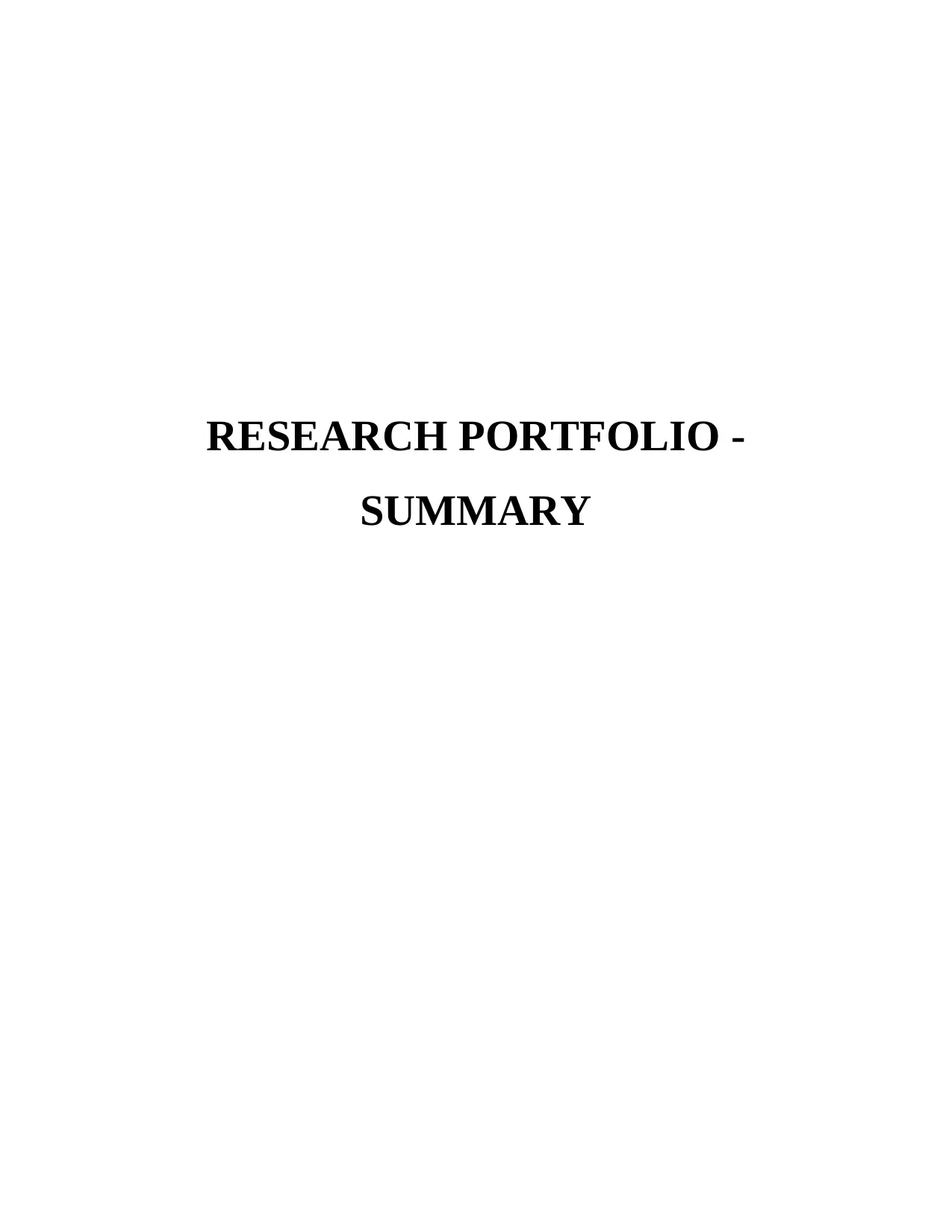
RESEARCH PORTFOLIO -
SUMMARY
SUMMARY
Paraphrase This Document
Need a fresh take? Get an instant paraphrase of this document with our AI Paraphraser
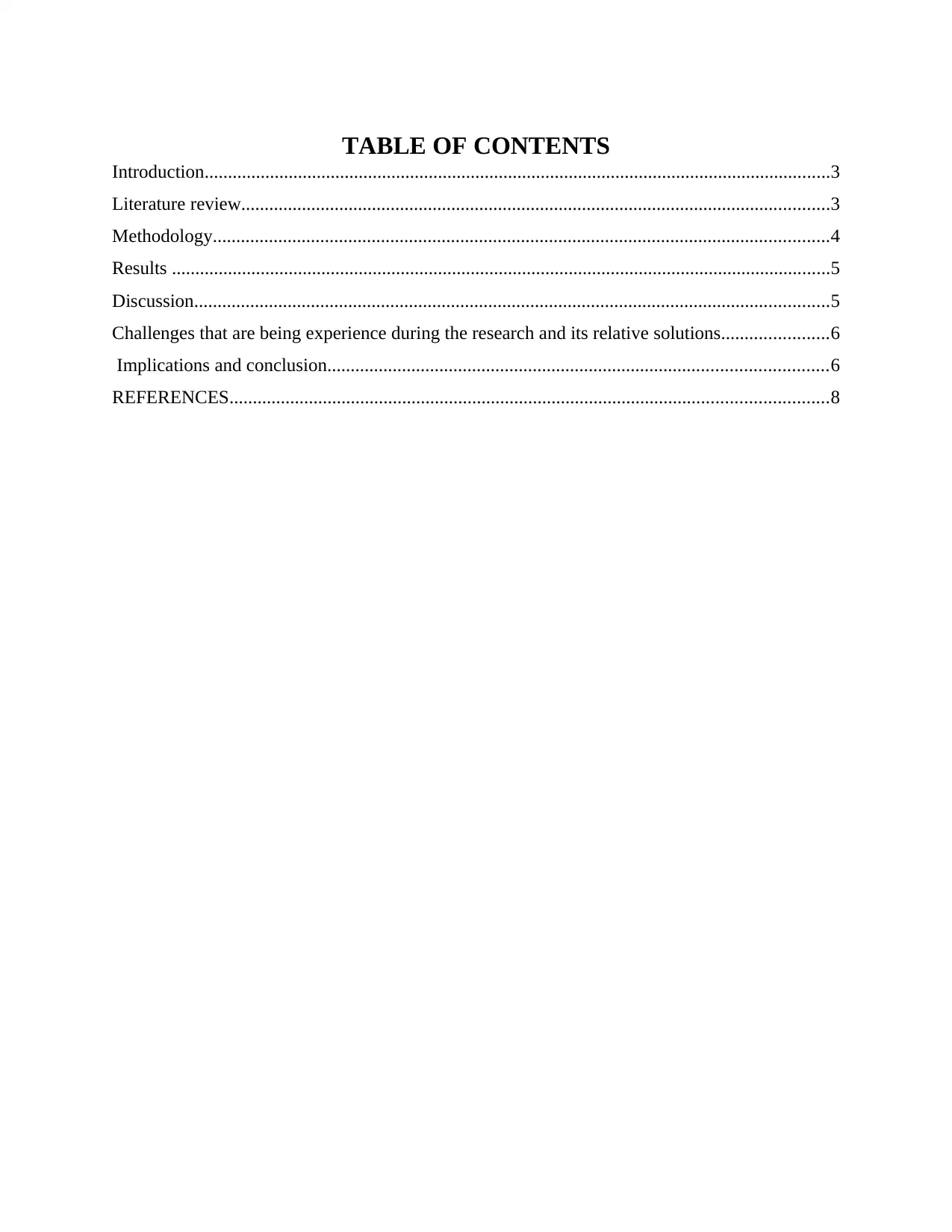
TABLE OF CONTENTS
Introduction......................................................................................................................................3
Literature review..............................................................................................................................3
Methodology....................................................................................................................................4
Results .............................................................................................................................................5
Discussion........................................................................................................................................5
Challenges that are being experience during the research and its relative solutions.......................6
Implications and conclusion...........................................................................................................6
REFERENCES................................................................................................................................8
Introduction......................................................................................................................................3
Literature review..............................................................................................................................3
Methodology....................................................................................................................................4
Results .............................................................................................................................................5
Discussion........................................................................................................................................5
Challenges that are being experience during the research and its relative solutions.......................6
Implications and conclusion...........................................................................................................6
REFERENCES................................................................................................................................8
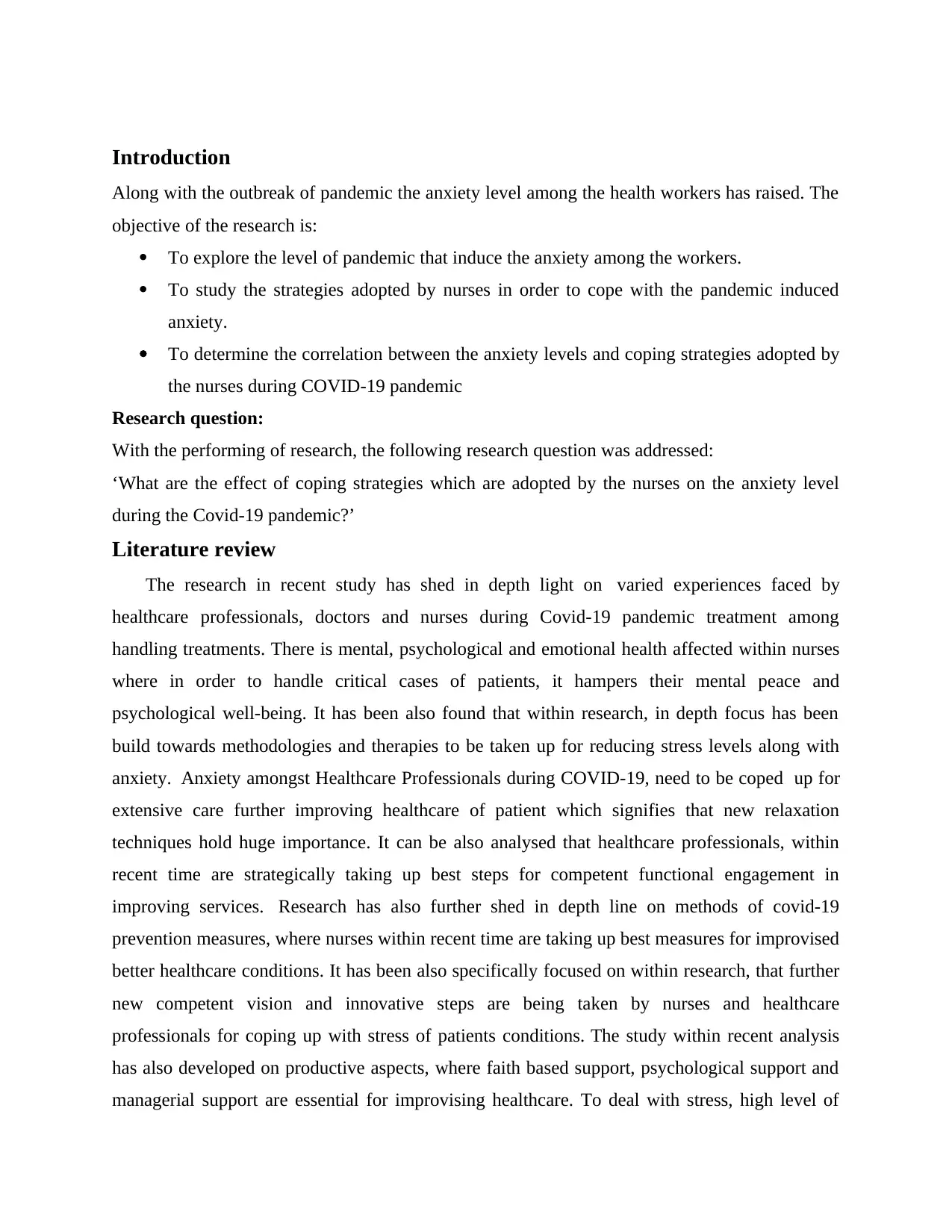
Introduction
Along with the outbreak of pandemic the anxiety level among the health workers has raised. The
objective of the research is:
To explore the level of pandemic that induce the anxiety among the workers.
To study the strategies adopted by nurses in order to cope with the pandemic induced
anxiety.
To determine the correlation between the anxiety levels and coping strategies adopted by
the nurses during COVID-19 pandemic
Research question:
With the performing of research, the following research question was addressed:
‘What are the effect of coping strategies which are adopted by the nurses on the anxiety level
during the Covid-19 pandemic?’
Literature review
The research in recent study has shed in depth light on varied experiences faced by
healthcare professionals, doctors and nurses during Covid-19 pandemic treatment among
handling treatments. There is mental, psychological and emotional health affected within nurses
where in order to handle critical cases of patients, it hampers their mental peace and
psychological well-being. It has been also found that within research, in depth focus has been
build towards methodologies and therapies to be taken up for reducing stress levels along with
anxiety. Anxiety amongst Healthcare Professionals during COVID-19, need to be coped up for
extensive care further improving healthcare of patient which signifies that new relaxation
techniques hold huge importance. It can be also analysed that healthcare professionals, within
recent time are strategically taking up best steps for competent functional engagement in
improving services. Research has also further shed in depth line on methods of covid-19
prevention measures, where nurses within recent time are taking up best measures for improvised
better healthcare conditions. It has been also specifically focused on within research, that further
new competent vision and innovative steps are being taken by nurses and healthcare
professionals for coping up with stress of patients conditions. The study within recent analysis
has also developed on productive aspects, where faith based support, psychological support and
managerial support are essential for improvising healthcare. To deal with stress, high level of
Along with the outbreak of pandemic the anxiety level among the health workers has raised. The
objective of the research is:
To explore the level of pandemic that induce the anxiety among the workers.
To study the strategies adopted by nurses in order to cope with the pandemic induced
anxiety.
To determine the correlation between the anxiety levels and coping strategies adopted by
the nurses during COVID-19 pandemic
Research question:
With the performing of research, the following research question was addressed:
‘What are the effect of coping strategies which are adopted by the nurses on the anxiety level
during the Covid-19 pandemic?’
Literature review
The research in recent study has shed in depth light on varied experiences faced by
healthcare professionals, doctors and nurses during Covid-19 pandemic treatment among
handling treatments. There is mental, psychological and emotional health affected within nurses
where in order to handle critical cases of patients, it hampers their mental peace and
psychological well-being. It has been also found that within research, in depth focus has been
build towards methodologies and therapies to be taken up for reducing stress levels along with
anxiety. Anxiety amongst Healthcare Professionals during COVID-19, need to be coped up for
extensive care further improving healthcare of patient which signifies that new relaxation
techniques hold huge importance. It can be also analysed that healthcare professionals, within
recent time are strategically taking up best steps for competent functional engagement in
improving services. Research has also further shed in depth line on methods of covid-19
prevention measures, where nurses within recent time are taking up best measures for improvised
better healthcare conditions. It has been also specifically focused on within research, that further
new competent vision and innovative steps are being taken by nurses and healthcare
professionals for coping up with stress of patients conditions. The study within recent analysis
has also developed on productive aspects, where faith based support, psychological support and
managerial support are essential for improvising healthcare. To deal with stress, high level of
⊘ This is a preview!⊘
Do you want full access?
Subscribe today to unlock all pages.

Trusted by 1+ million students worldwide
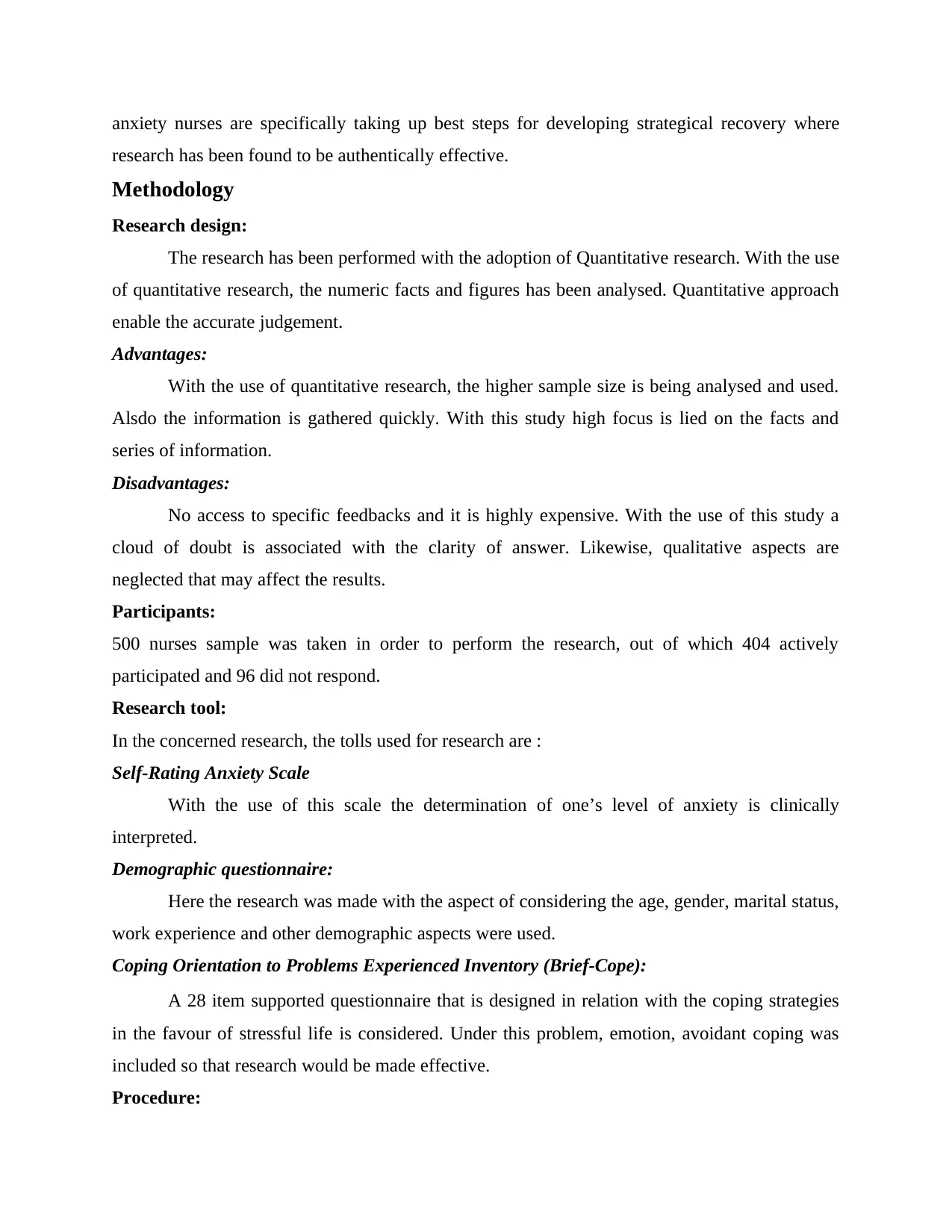
anxiety nurses are specifically taking up best steps for developing strategical recovery where
research has been found to be authentically effective.
Methodology
Research design:
The research has been performed with the adoption of Quantitative research. With the use
of quantitative research, the numeric facts and figures has been analysed. Quantitative approach
enable the accurate judgement.
Advantages:
With the use of quantitative research, the higher sample size is being analysed and used.
Alsdo the information is gathered quickly. With this study high focus is lied on the facts and
series of information.
Disadvantages:
No access to specific feedbacks and it is highly expensive. With the use of this study a
cloud of doubt is associated with the clarity of answer. Likewise, qualitative aspects are
neglected that may affect the results.
Participants:
500 nurses sample was taken in order to perform the research, out of which 404 actively
participated and 96 did not respond.
Research tool:
In the concerned research, the tolls used for research are :
Self-Rating Anxiety Scale
With the use of this scale the determination of one’s level of anxiety is clinically
interpreted.
Demographic questionnaire:
Here the research was made with the aspect of considering the age, gender, marital status,
work experience and other demographic aspects were used.
Coping Orientation to Problems Experienced Inventory (Brief-Cope):
A 28 item supported questionnaire that is designed in relation with the coping strategies
in the favour of stressful life is considered. Under this problem, emotion, avoidant coping was
included so that research would be made effective.
Procedure:
research has been found to be authentically effective.
Methodology
Research design:
The research has been performed with the adoption of Quantitative research. With the use
of quantitative research, the numeric facts and figures has been analysed. Quantitative approach
enable the accurate judgement.
Advantages:
With the use of quantitative research, the higher sample size is being analysed and used.
Alsdo the information is gathered quickly. With this study high focus is lied on the facts and
series of information.
Disadvantages:
No access to specific feedbacks and it is highly expensive. With the use of this study a
cloud of doubt is associated with the clarity of answer. Likewise, qualitative aspects are
neglected that may affect the results.
Participants:
500 nurses sample was taken in order to perform the research, out of which 404 actively
participated and 96 did not respond.
Research tool:
In the concerned research, the tolls used for research are :
Self-Rating Anxiety Scale
With the use of this scale the determination of one’s level of anxiety is clinically
interpreted.
Demographic questionnaire:
Here the research was made with the aspect of considering the age, gender, marital status,
work experience and other demographic aspects were used.
Coping Orientation to Problems Experienced Inventory (Brief-Cope):
A 28 item supported questionnaire that is designed in relation with the coping strategies
in the favour of stressful life is considered. Under this problem, emotion, avoidant coping was
included so that research would be made effective.
Procedure:
Paraphrase This Document
Need a fresh take? Get an instant paraphrase of this document with our AI Paraphraser
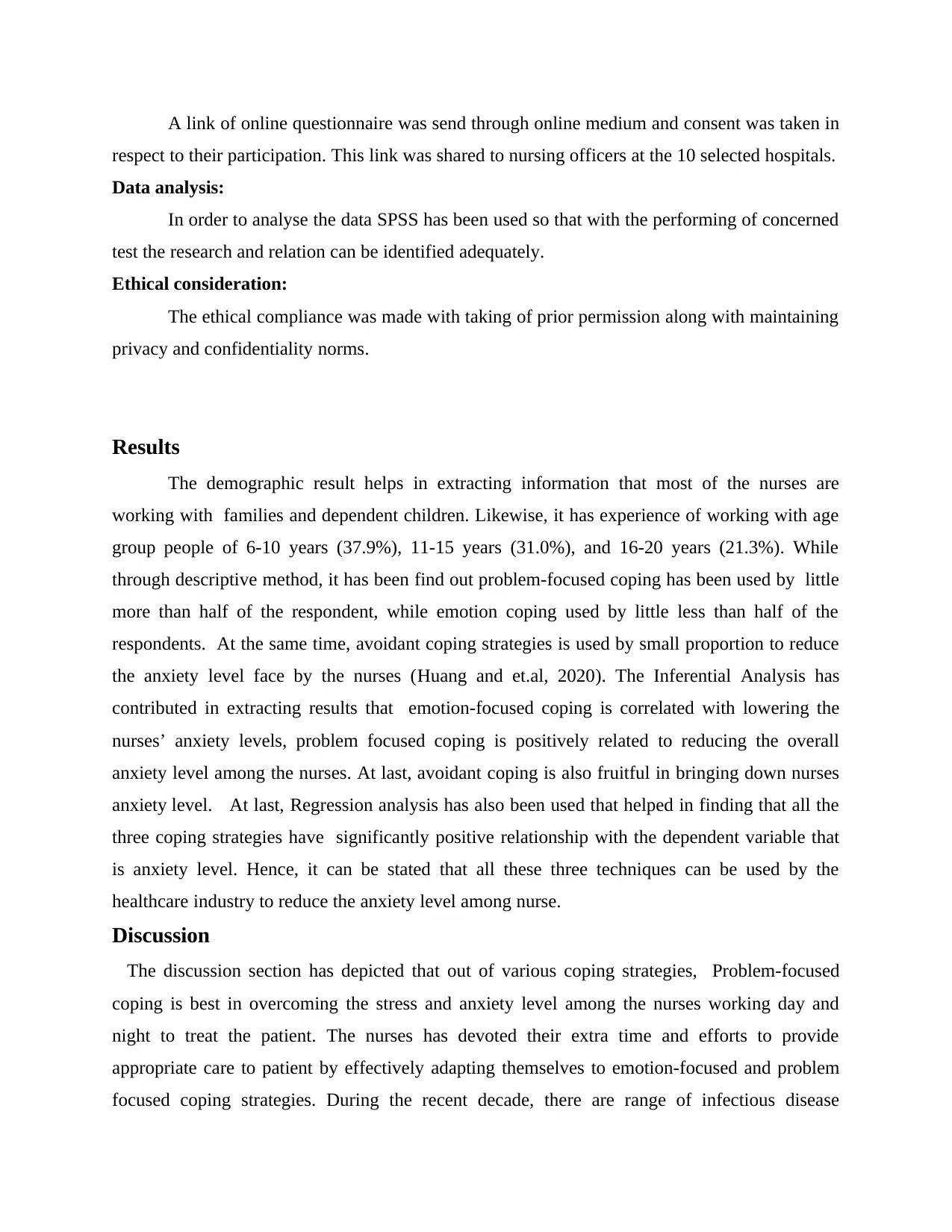
A link of online questionnaire was send through online medium and consent was taken in
respect to their participation. This link was shared to nursing officers at the 10 selected hospitals.
Data analysis:
In order to analyse the data SPSS has been used so that with the performing of concerned
test the research and relation can be identified adequately.
Ethical consideration:
The ethical compliance was made with taking of prior permission along with maintaining
privacy and confidentiality norms.
Results
The demographic result helps in extracting information that most of the nurses are
working with families and dependent children. Likewise, it has experience of working with age
group people of 6-10 years (37.9%), 11-15 years (31.0%), and 16-20 years (21.3%). While
through descriptive method, it has been find out problem-focused coping has been used by little
more than half of the respondent, while emotion coping used by little less than half of the
respondents. At the same time, avoidant coping strategies is used by small proportion to reduce
the anxiety level face by the nurses (Huang and et.al, 2020). The Inferential Analysis has
contributed in extracting results that emotion-focused coping is correlated with lowering the
nurses’ anxiety levels, problem focused coping is positively related to reducing the overall
anxiety level among the nurses. At last, avoidant coping is also fruitful in bringing down nurses
anxiety level. At last, Regression analysis has also been used that helped in finding that all the
three coping strategies have significantly positive relationship with the dependent variable that
is anxiety level. Hence, it can be stated that all these three techniques can be used by the
healthcare industry to reduce the anxiety level among nurse.
Discussion
The discussion section has depicted that out of various coping strategies, Problem-focused
coping is best in overcoming the stress and anxiety level among the nurses working day and
night to treat the patient. The nurses has devoted their extra time and efforts to provide
appropriate care to patient by effectively adapting themselves to emotion-focused and problem
focused coping strategies. During the recent decade, there are range of infectious disease
respect to their participation. This link was shared to nursing officers at the 10 selected hospitals.
Data analysis:
In order to analyse the data SPSS has been used so that with the performing of concerned
test the research and relation can be identified adequately.
Ethical consideration:
The ethical compliance was made with taking of prior permission along with maintaining
privacy and confidentiality norms.
Results
The demographic result helps in extracting information that most of the nurses are
working with families and dependent children. Likewise, it has experience of working with age
group people of 6-10 years (37.9%), 11-15 years (31.0%), and 16-20 years (21.3%). While
through descriptive method, it has been find out problem-focused coping has been used by little
more than half of the respondent, while emotion coping used by little less than half of the
respondents. At the same time, avoidant coping strategies is used by small proportion to reduce
the anxiety level face by the nurses (Huang and et.al, 2020). The Inferential Analysis has
contributed in extracting results that emotion-focused coping is correlated with lowering the
nurses’ anxiety levels, problem focused coping is positively related to reducing the overall
anxiety level among the nurses. At last, avoidant coping is also fruitful in bringing down nurses
anxiety level. At last, Regression analysis has also been used that helped in finding that all the
three coping strategies have significantly positive relationship with the dependent variable that
is anxiety level. Hence, it can be stated that all these three techniques can be used by the
healthcare industry to reduce the anxiety level among nurse.
Discussion
The discussion section has depicted that out of various coping strategies, Problem-focused
coping is best in overcoming the stress and anxiety level among the nurses working day and
night to treat the patient. The nurses has devoted their extra time and efforts to provide
appropriate care to patient by effectively adapting themselves to emotion-focused and problem
focused coping strategies. During the recent decade, there are range of infectious disease
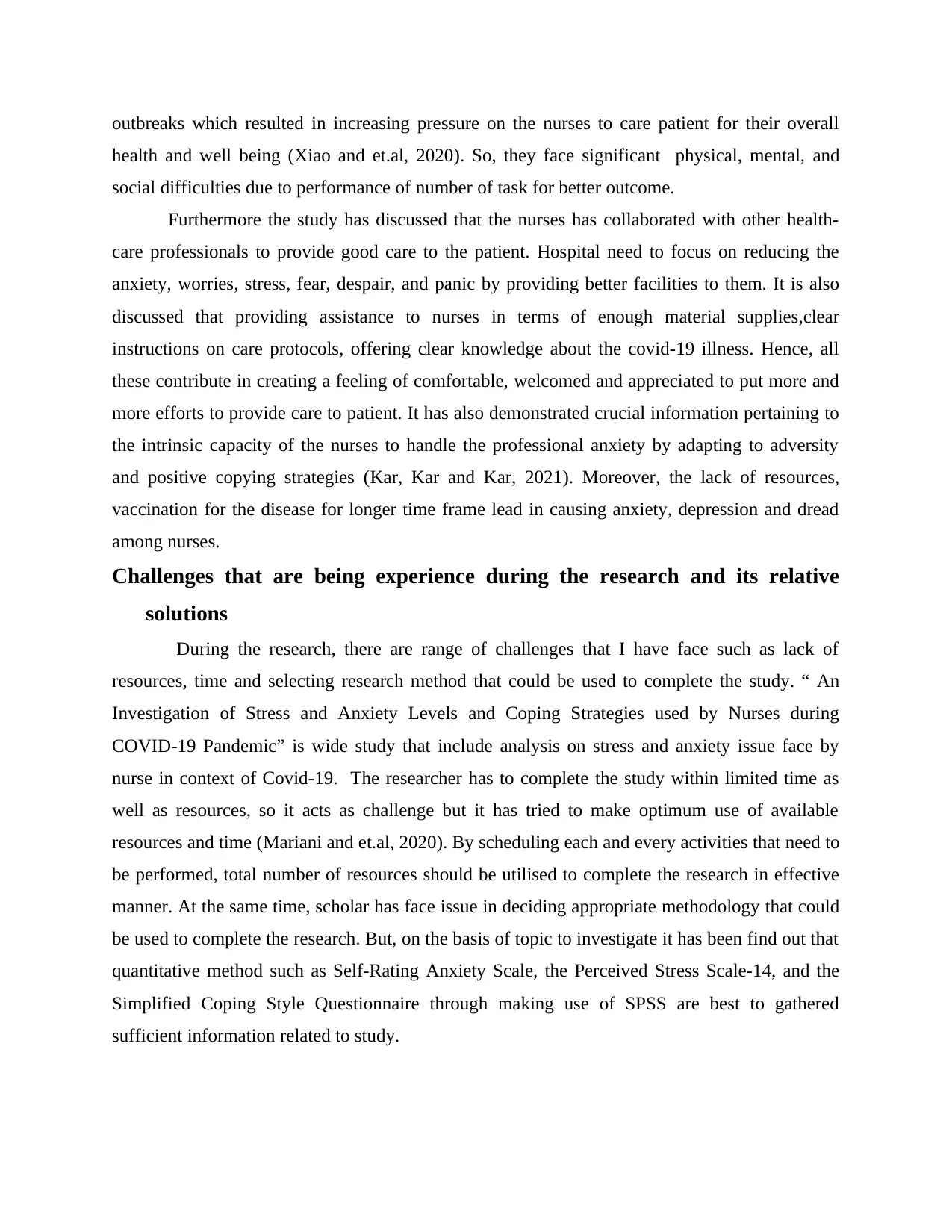
outbreaks which resulted in increasing pressure on the nurses to care patient for their overall
health and well being (Xiao and et.al, 2020). So, they face significant physical, mental, and
social difficulties due to performance of number of task for better outcome.
Furthermore the study has discussed that the nurses has collaborated with other health-
care professionals to provide good care to the patient. Hospital need to focus on reducing the
anxiety, worries, stress, fear, despair, and panic by providing better facilities to them. It is also
discussed that providing assistance to nurses in terms of enough material supplies,clear
instructions on care protocols, offering clear knowledge about the covid-19 illness. Hence, all
these contribute in creating a feeling of comfortable, welcomed and appreciated to put more and
more efforts to provide care to patient. It has also demonstrated crucial information pertaining to
the intrinsic capacity of the nurses to handle the professional anxiety by adapting to adversity
and positive copying strategies (Kar, Kar and Kar, 2021). Moreover, the lack of resources,
vaccination for the disease for longer time frame lead in causing anxiety, depression and dread
among nurses.
Challenges that are being experience during the research and its relative
solutions
During the research, there are range of challenges that I have face such as lack of
resources, time and selecting research method that could be used to complete the study. “ An
Investigation of Stress and Anxiety Levels and Coping Strategies used by Nurses during
COVID-19 Pandemic” is wide study that include analysis on stress and anxiety issue face by
nurse in context of Covid-19. The researcher has to complete the study within limited time as
well as resources, so it acts as challenge but it has tried to make optimum use of available
resources and time (Mariani and et.al, 2020). By scheduling each and every activities that need to
be performed, total number of resources should be utilised to complete the research in effective
manner. At the same time, scholar has face issue in deciding appropriate methodology that could
be used to complete the research. But, on the basis of topic to investigate it has been find out that
quantitative method such as Self-Rating Anxiety Scale, the Perceived Stress Scale-14, and the
Simplified Coping Style Questionnaire through making use of SPSS are best to gathered
sufficient information related to study.
health and well being (Xiao and et.al, 2020). So, they face significant physical, mental, and
social difficulties due to performance of number of task for better outcome.
Furthermore the study has discussed that the nurses has collaborated with other health-
care professionals to provide good care to the patient. Hospital need to focus on reducing the
anxiety, worries, stress, fear, despair, and panic by providing better facilities to them. It is also
discussed that providing assistance to nurses in terms of enough material supplies,clear
instructions on care protocols, offering clear knowledge about the covid-19 illness. Hence, all
these contribute in creating a feeling of comfortable, welcomed and appreciated to put more and
more efforts to provide care to patient. It has also demonstrated crucial information pertaining to
the intrinsic capacity of the nurses to handle the professional anxiety by adapting to adversity
and positive copying strategies (Kar, Kar and Kar, 2021). Moreover, the lack of resources,
vaccination for the disease for longer time frame lead in causing anxiety, depression and dread
among nurses.
Challenges that are being experience during the research and its relative
solutions
During the research, there are range of challenges that I have face such as lack of
resources, time and selecting research method that could be used to complete the study. “ An
Investigation of Stress and Anxiety Levels and Coping Strategies used by Nurses during
COVID-19 Pandemic” is wide study that include analysis on stress and anxiety issue face by
nurse in context of Covid-19. The researcher has to complete the study within limited time as
well as resources, so it acts as challenge but it has tried to make optimum use of available
resources and time (Mariani and et.al, 2020). By scheduling each and every activities that need to
be performed, total number of resources should be utilised to complete the research in effective
manner. At the same time, scholar has face issue in deciding appropriate methodology that could
be used to complete the research. But, on the basis of topic to investigate it has been find out that
quantitative method such as Self-Rating Anxiety Scale, the Perceived Stress Scale-14, and the
Simplified Coping Style Questionnaire through making use of SPSS are best to gathered
sufficient information related to study.
⊘ This is a preview!⊘
Do you want full access?
Subscribe today to unlock all pages.

Trusted by 1+ million students worldwide
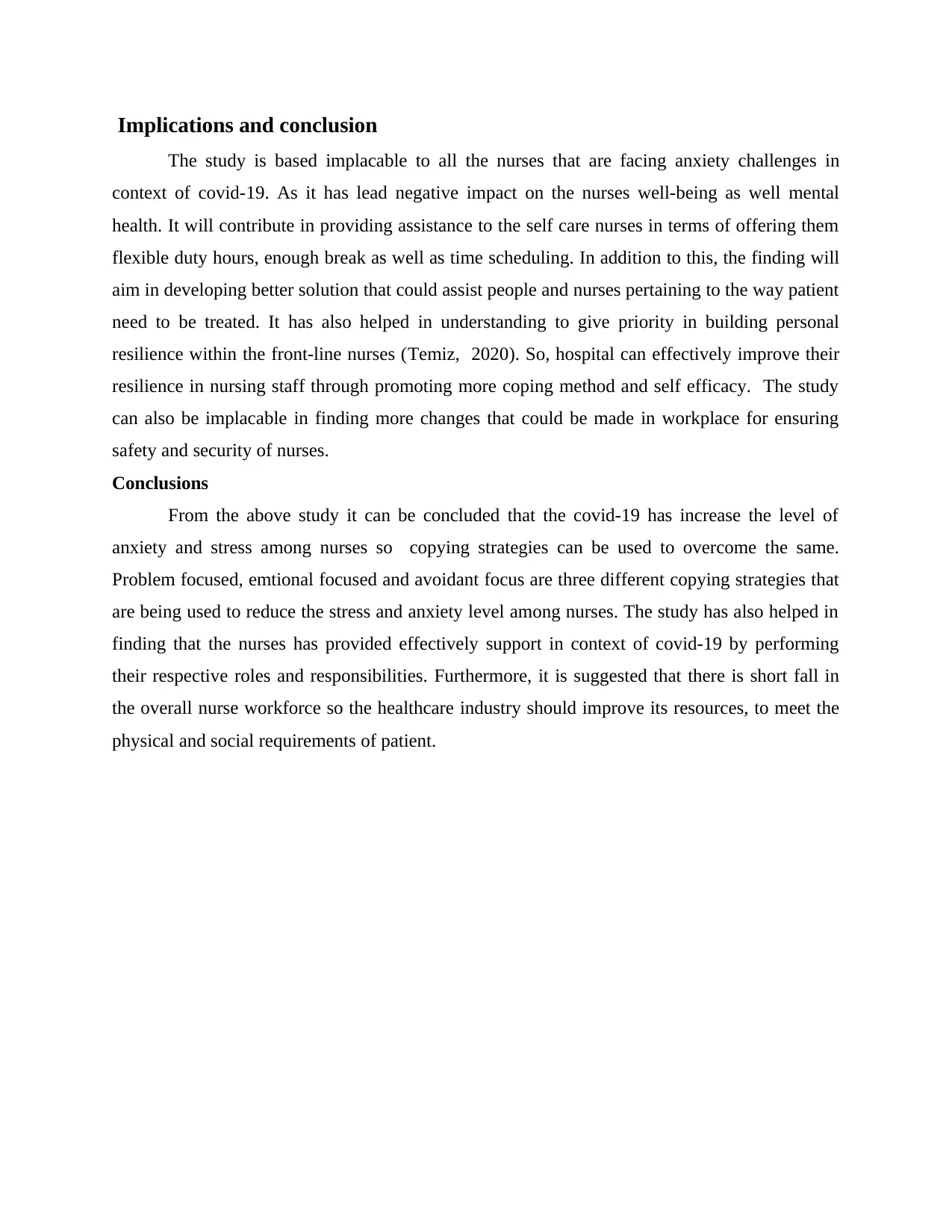
Implications and conclusion
The study is based implacable to all the nurses that are facing anxiety challenges in
context of covid-19. As it has lead negative impact on the nurses well-being as well mental
health. It will contribute in providing assistance to the self care nurses in terms of offering them
flexible duty hours, enough break as well as time scheduling. In addition to this, the finding will
aim in developing better solution that could assist people and nurses pertaining to the way patient
need to be treated. It has also helped in understanding to give priority in building personal
resilience within the front-line nurses (Temiz, 2020). So, hospital can effectively improve their
resilience in nursing staff through promoting more coping method and self efficacy. The study
can also be implacable in finding more changes that could be made in workplace for ensuring
safety and security of nurses.
Conclusions
From the above study it can be concluded that the covid-19 has increase the level of
anxiety and stress among nurses so copying strategies can be used to overcome the same.
Problem focused, emtional focused and avoidant focus are three different copying strategies that
are being used to reduce the stress and anxiety level among nurses. The study has also helped in
finding that the nurses has provided effectively support in context of covid-19 by performing
their respective roles and responsibilities. Furthermore, it is suggested that there is short fall in
the overall nurse workforce so the healthcare industry should improve its resources, to meet the
physical and social requirements of patient.
The study is based implacable to all the nurses that are facing anxiety challenges in
context of covid-19. As it has lead negative impact on the nurses well-being as well mental
health. It will contribute in providing assistance to the self care nurses in terms of offering them
flexible duty hours, enough break as well as time scheduling. In addition to this, the finding will
aim in developing better solution that could assist people and nurses pertaining to the way patient
need to be treated. It has also helped in understanding to give priority in building personal
resilience within the front-line nurses (Temiz, 2020). So, hospital can effectively improve their
resilience in nursing staff through promoting more coping method and self efficacy. The study
can also be implacable in finding more changes that could be made in workplace for ensuring
safety and security of nurses.
Conclusions
From the above study it can be concluded that the covid-19 has increase the level of
anxiety and stress among nurses so copying strategies can be used to overcome the same.
Problem focused, emtional focused and avoidant focus are three different copying strategies that
are being used to reduce the stress and anxiety level among nurses. The study has also helped in
finding that the nurses has provided effectively support in context of covid-19 by performing
their respective roles and responsibilities. Furthermore, it is suggested that there is short fall in
the overall nurse workforce so the healthcare industry should improve its resources, to meet the
physical and social requirements of patient.
Paraphrase This Document
Need a fresh take? Get an instant paraphrase of this document with our AI Paraphraser
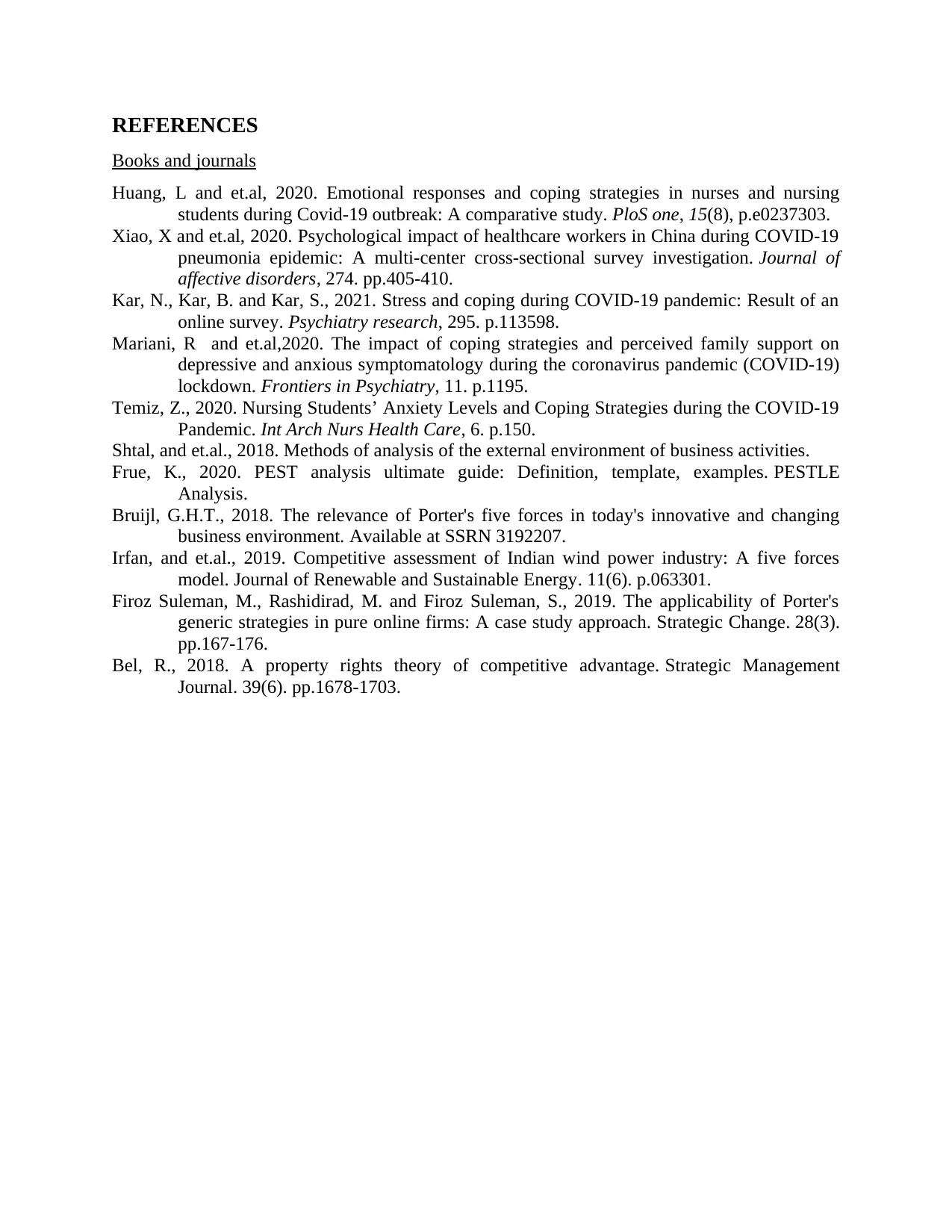
REFERENCES
Books and journals
Huang, L and et.al, 2020. Emotional responses and coping strategies in nurses and nursing
students during Covid-19 outbreak: A comparative study. PloS one, 15(8), p.e0237303.
Xiao, X and et.al, 2020. Psychological impact of healthcare workers in China during COVID-19
pneumonia epidemic: A multi-center cross-sectional survey investigation. Journal of
affective disorders, 274. pp.405-410.
Kar, N., Kar, B. and Kar, S., 2021. Stress and coping during COVID-19 pandemic: Result of an
online survey. Psychiatry research, 295. p.113598.
Mariani, R and et.al,2020. The impact of coping strategies and perceived family support on
depressive and anxious symptomatology during the coronavirus pandemic (COVID-19)
lockdown. Frontiers in Psychiatry, 11. p.1195.
Temiz, Z., 2020. Nursing Students’ Anxiety Levels and Coping Strategies during the COVID-19
Pandemic. Int Arch Nurs Health Care, 6. p.150.
Shtal, and et.al., 2018. Methods of analysis of the external environment of business activities.
Frue, K., 2020. PEST analysis ultimate guide: Definition, template, examples. PESTLE
Analysis.
Bruijl, G.H.T., 2018. The relevance of Porter's five forces in today's innovative and changing
business environment. Available at SSRN 3192207.
Irfan, and et.al., 2019. Competitive assessment of Indian wind power industry: A five forces
model. Journal of Renewable and Sustainable Energy. 11(6). p.063301.
Firoz Suleman, M., Rashidirad, M. and Firoz Suleman, S., 2019. The applicability of Porter's
generic strategies in pure online firms: A case study approach. Strategic Change. 28(3).
pp.167-176.
Bel, R., 2018. A property rights theory of competitive advantage. Strategic Management
Journal. 39(6). pp.1678-1703.
Books and journals
Huang, L and et.al, 2020. Emotional responses and coping strategies in nurses and nursing
students during Covid-19 outbreak: A comparative study. PloS one, 15(8), p.e0237303.
Xiao, X and et.al, 2020. Psychological impact of healthcare workers in China during COVID-19
pneumonia epidemic: A multi-center cross-sectional survey investigation. Journal of
affective disorders, 274. pp.405-410.
Kar, N., Kar, B. and Kar, S., 2021. Stress and coping during COVID-19 pandemic: Result of an
online survey. Psychiatry research, 295. p.113598.
Mariani, R and et.al,2020. The impact of coping strategies and perceived family support on
depressive and anxious symptomatology during the coronavirus pandemic (COVID-19)
lockdown. Frontiers in Psychiatry, 11. p.1195.
Temiz, Z., 2020. Nursing Students’ Anxiety Levels and Coping Strategies during the COVID-19
Pandemic. Int Arch Nurs Health Care, 6. p.150.
Shtal, and et.al., 2018. Methods of analysis of the external environment of business activities.
Frue, K., 2020. PEST analysis ultimate guide: Definition, template, examples. PESTLE
Analysis.
Bruijl, G.H.T., 2018. The relevance of Porter's five forces in today's innovative and changing
business environment. Available at SSRN 3192207.
Irfan, and et.al., 2019. Competitive assessment of Indian wind power industry: A five forces
model. Journal of Renewable and Sustainable Energy. 11(6). p.063301.
Firoz Suleman, M., Rashidirad, M. and Firoz Suleman, S., 2019. The applicability of Porter's
generic strategies in pure online firms: A case study approach. Strategic Change. 28(3).
pp.167-176.
Bel, R., 2018. A property rights theory of competitive advantage. Strategic Management
Journal. 39(6). pp.1678-1703.
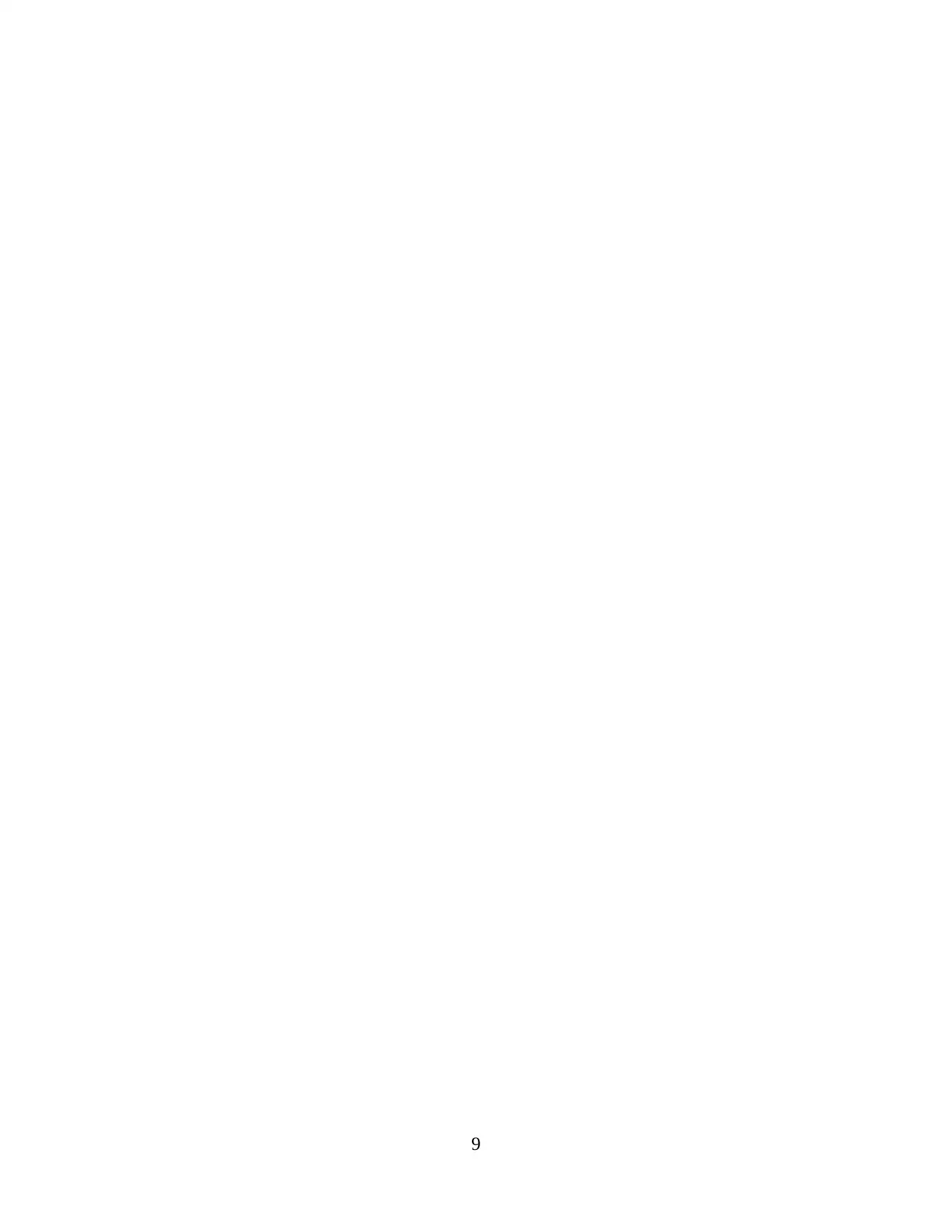
9
⊘ This is a preview!⊘
Do you want full access?
Subscribe today to unlock all pages.

Trusted by 1+ million students worldwide
1 out of 9
Related Documents
Your All-in-One AI-Powered Toolkit for Academic Success.
+13062052269
info@desklib.com
Available 24*7 on WhatsApp / Email
![[object Object]](/_next/static/media/star-bottom.7253800d.svg)
Unlock your academic potential
Copyright © 2020–2026 A2Z Services. All Rights Reserved. Developed and managed by ZUCOL.





